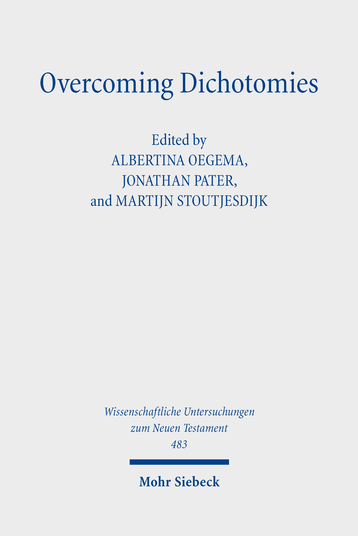Theologie
Overcoming Dichotomies
Parables, Fables, and Similes in the Graeco-Roman World
Edited by Albertina Oegema, Jonathan Pater, and Martijn Stoutjesdijk
[Überwindung von Dichotomien. Parabeln, Fabeln und Gleichnisse in der griechisch-römischen Welt.]
Auch verfügbar als:
Veröffentlicht auf Englisch.
Dieser Band bietet eine interdisziplinäre Untersuchung von Parabeln, Fabeln und Gleichnissen aus einer Reihe griechisch-römischer, jüdischer und christlicher Quellen in der Antike. Die Autoren und Autorinnen beleuchten sowohl die fließenden Grenzen zwischen diesen Gattungen als auch ihre unterschiedlichen literarischen Adaptionen.Inhaltsübersicht
Albertina Oegema/Martijn Stoutjesdijk: Beyond the Parable-Fable Dichotomy: An Introduction to the Volume− Jonathan Pater: Parables in the New Testament and Rabbinic Literature between Simile and Fable: A status quaestionisGreek and Roman Literature
Jeremy B. Lefkowitz: Fabulous Style: Learning to Compose Fables in the Progymnasmata − Gerard J. Boter: »Look at Heracles!« The Role of Similes and Exempla in Epictetus's Philosophical Teaching − Annemarie Ambühl: Animal Similes in Roman Imperial Epic in Their Literary, Cultural, and Political Contexts − Ruben Zimmermann: The Fables according to Babrius and the New Testament Parables
Early Jewish and Rabbinic Literature
Sean A. Adams: Fables in Philo of Alexandria: λόγος, μ ῦθος, and παραβολή − Stephen Llewelyn/Lydia Gore-Jones: Cognitive Blending Theory and the Mashal of the Forest and the Sea in 4 Ezra 4:13–17: The Boundedness of Human Knowledge − Lieve Teugels: From the Lion to the Snake, from the Wolf to the Bear: Rescue and Punishment in Classical Fables and Rabbinic Meshalim − Galit Hasan-Rokem: Folk Narrative Poetics of Late Antique Parables and Fables: The Rabbis' Double Vision − Lorena Miralles Maciá: Folktale Images in the Midrashic Context: Fable Motifs in Leviticus Rabbah 4
New Testament and Early Christian Literature
Catherine Hezser: Finding a Treasure: The Treasure Motif in Jewish, Christian, and Graeco-Roman Narratives in the Context of Rabbinic Halakhah and Roman Law − Justin D. Strong: How to Interpret Parables in Light of the Fable: Lessons from the Promythium and Epimythium − Mary Ann Beavis: Fables, Parables and Slaves: Epictetus, Aesop and the Gospels in Conversation with North American Slave Narratives − Konrad Schwarz: Parabolic Stories in the Gospel of Thomas and the Aesopic Tradition: Some Reflections on Reading Practices and Literary Traditions in the Second and Third Century − Ingvild S. Gilhus: »You Ought to Observe Hounds When They Are Hunting Hares«: Examples and Similes about Animals in the Apophthegmata Patrum
Diachronic Perspectives
Peter J. Tomson: Fables, Proverbs, Parables, Allegories: Ancient Border-Crossing Lore
